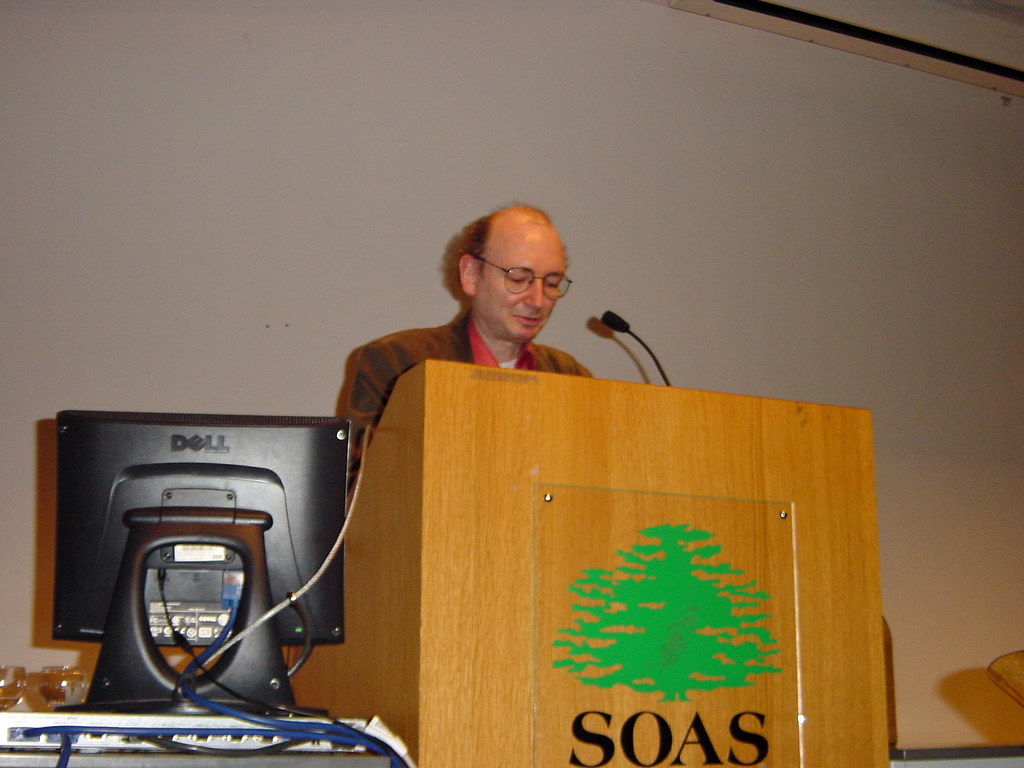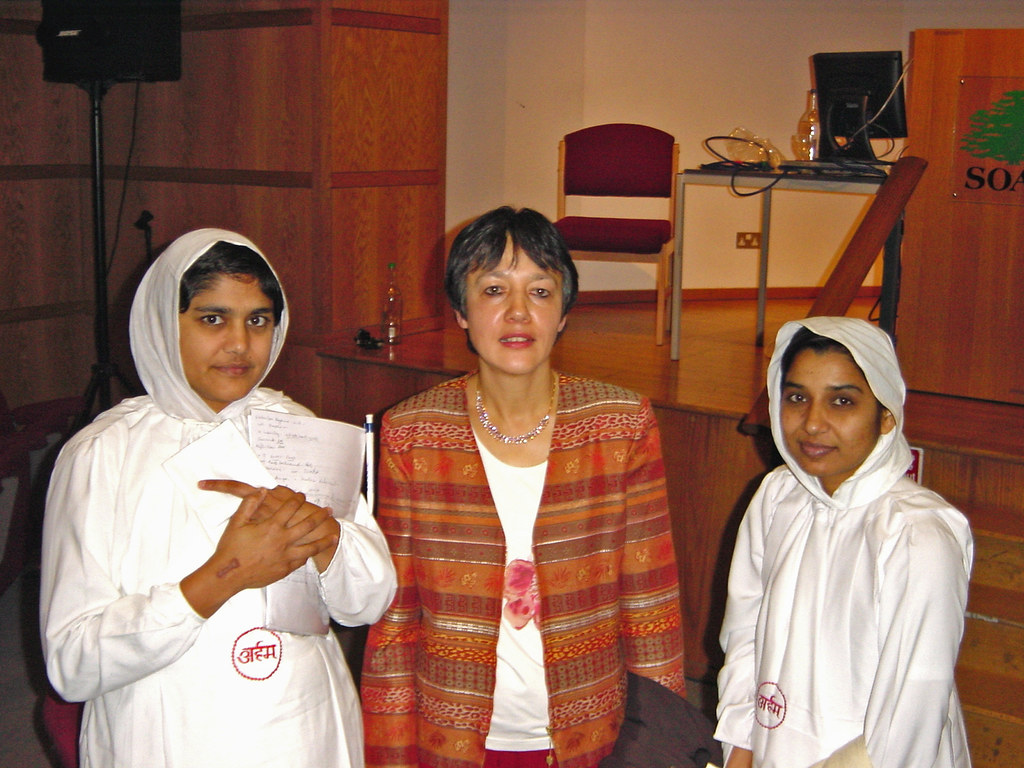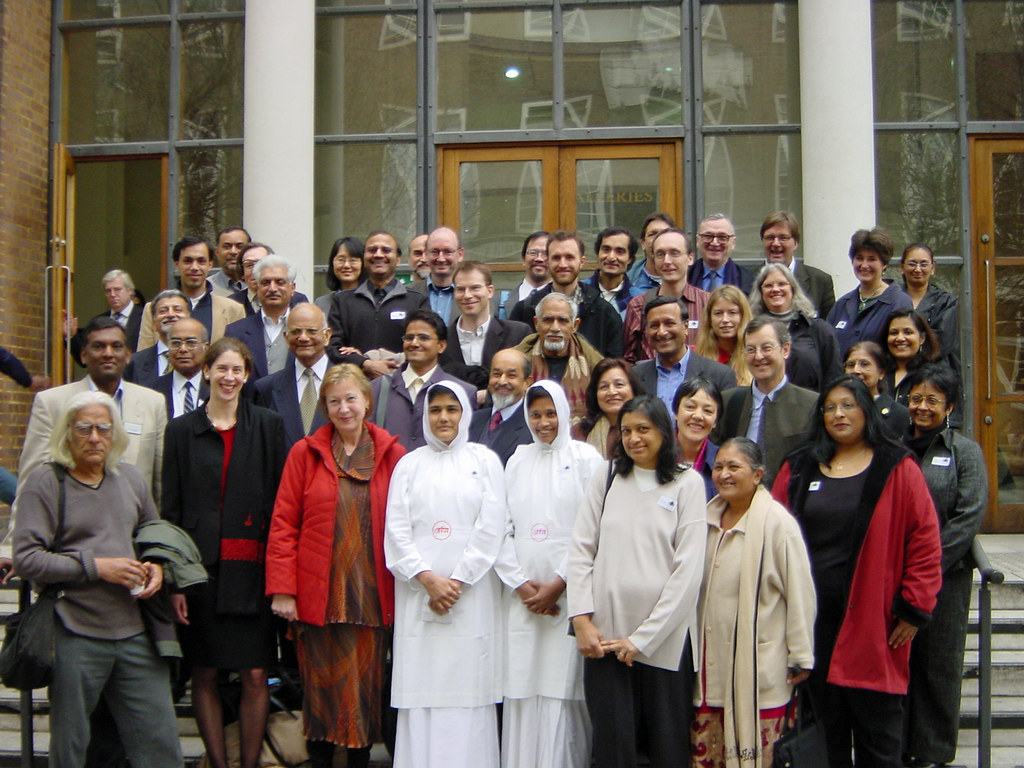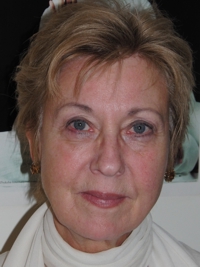 Dr. Peter Flügel, Chair Of Centre Of Jaina Studies, SOAS, University of London
Dr. Peter Flügel, Chair Of Centre Of Jaina Studies, SOAS, University of London
On March 16th, 6 pm, Dr. Ulrich Pagel, head of the Department of Religions at SOAS, Chair of the Department of the Study of Religions, Prof J.C. Wright of the Faculty of Languages and Cultures and Dr. Peter Flügel (photo), Department of the Study of Religions, launched on behalf of SOAS the Centre of Jaina Studies. Due to the various sources for Jaina studies London is a very good choice for such a centre and the first of such an institution outside of India. Prof. Wright gave an overview on the history of Jaina studies at SOAS. He underlined the great merits of Jaina monks who had maintained the tradition of copying continually various ancient scriptures. Without their transmission the actual studies would not have been possible.
 Prof. Nalini Balbir, Iniversity Paris, flanked by Samani Pratibha Pragya and Samani Punya Pragya
Prof. Nalini Balbir, Iniversity Paris, flanked by Samani Pratibha Pragya and Samani Punya Pragya
The British Jain community had lobbied since twenty years for the establishment of such a scientific centre in Britain. Anant Shah, chairman of the renowned ‘Jain Spirit’ magazine, has granted a scholarship of British pound 5000 for this aim to realise scientific research based on both texts and living practice like Prof. Klaus Bruhn, Berlin, Germany, had put it once.
The 4th annual lecture on Jainism was given by Professor Nalini Balbir, Paris, (photo with Samanijis) on ‘Thoughts on the meaning and the role of the Svetambara Canon in the history of Jainism’. The lecture was based on late mediaeval and modern Agama texts. Prof. Balbir noted that the Digamber Jains do not admit women to be solvated and Kevali (omniscients) to have taken food, but the Svetamber Jains doubt thirteen texts to be composed by the omniscients (authorised disciples of Lord Mahavira). So the question arises which texts are accepted, forty-five or thirteen less.
Further Prof. Balbir stated that between the 17th and 19th century the scriptures were not read but worshipped, their lecture even was regarded as inauspicious. In 1884 the first printed edition was published with the aim that the whole text should be read and followed. According to Prof. Balbir the Agamas are no monolithic reality but regarded as living entity lacking any final version.
On the next day nine lectures were given. Erik Seldeslachts, Gent, tried ‘Understanding Jaina geography’, Julia Hegewald, Oxford, brought ‘Meru, Samavasarana and Simhasana: The Recurrence of Three-Tiered Structures in Jaina Cosmology, Mythology and Ritual’ near to the audience, whereas Hawon Ku Kim, University of Minnesota, did not hesitate to reveal the sources of money (Opium Trade!) behind the ‘Reconstruction of Identity: The Nineteenth-Century Jain Pilgrimage Site of Satrunjaya, Gujarat’. Peter Flügel, SOAS, made us participate on the non-idolatrise ‘Lonkagaccha Revisited’, whereas Jean-Pierre Osier, Paris, presented the ’Importance of faith in the last moments on account of Asadhara’s Sagaradharmamrta Viii’. After the lunch break there were four more lectures by Eva DeClerq, Gent, Christopher Chapple, Los Angeles, Sin Fujinaga, Myakonojo Miyazaki, and Devendra Kumar Jain, Mumbai.
 Group Photo
Group Photo
Dr. Atul Shah from ‘Jain Spirit’ proposed the release of an scientific online magazine on Jainism in the near future.
The final address was given to Samani Pratibha Pragyaji. She appreciated the workshop as an occasion for living Jainism embodied in most of the audience and the scholars of this field to interact. She invited scholars and all interested people to visit Jain Vishva Bharati Ladnun, India, for intense studies in Jainism and presented JVB London and its activities to a broader public.
 Editor Carla Geerdes
Editor Carla Geerdes